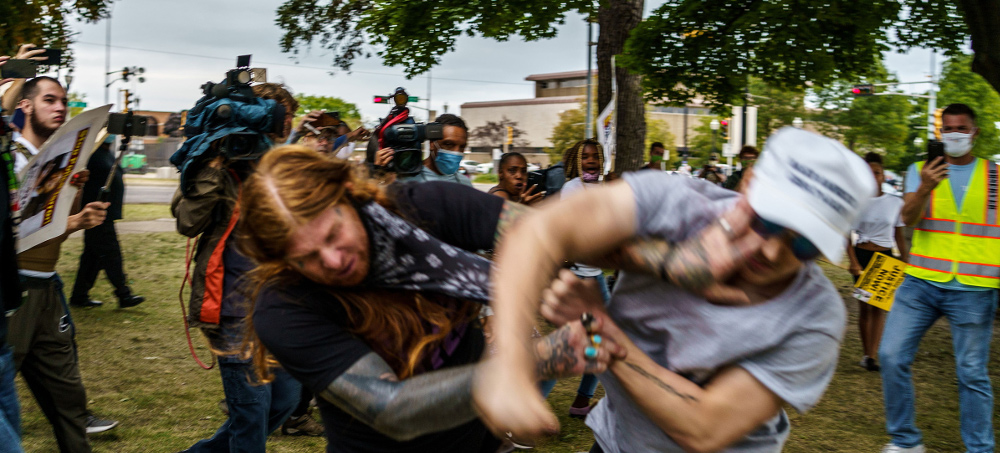We're Heading Into Rough Waters
John Kiriakou Reader Supported News A protester scuffles with a Trump supporter (R) in Kenosha, Wisconsin, on Sept. 1 amid ongoing demonstrations after the shooting by police of Jacob Blake. (photo: Kerem Yucel/Getty)
A protester scuffles with a Trump supporter (R) in Kenosha, Wisconsin, on Sept. 1 amid ongoing demonstrations after the shooting by police of Jacob Blake. (photo: Kerem Yucel/Getty) We're Heading Into Rough Waters
John Kiriakou Reader Supported NewsKirk responded by telling the audience member that violence wasn’t advisable, but not for any legal, moral, or ethical reasons. Instead, he said, referring to the Biden Administration, “We are living under fascism. We are living under this tyranny. But if you think for a second that they’re not wanting you to all of a sudden get to that next level where they’re going to say, ‘OK, we need Patriot Act 2.0.’ If you think that, you know, Waco is bad, wait until you see what they want to do next. What I’m saying is that we have a very fragile balance right now at our current time where we must exhaust every single peaceful means possible.”
The event at which this exchange took place sounds like a one-off gathering of violent right-wing lunatics, something that was relatively common after Donald Trump lost the 2020 election. But it’s not quite that simple. There are a lot of people who seem ready to take up arms. Significant minorities in both the Republican and Democratic parties support the use of violence against their political opposites.
According to a study done jointly by the Hoover Institution, the University of Maryland, and Louisiana State University, at least 20 percent of Americans are “quite willing” to use violence against members of the opposite political party. And 44 percent of Republicans and 41 percent of Democrats said political violence is “at least a little bit justified.” Those figures are up from 35 percent and 37 percent respectively before the 2020 election.
Among more ideological partisans, the numbers were even more startling. Among those identifying themselves as “very liberal,” 26 percent advocated violence against conservatives. Among those identifying themselves as “very conservative,” 16 percent advocated violence against liberals. Another nine percent of both “liberals” and “conservatives” respectively said that violence was “a little bit justified” to advance their political views.
A more recent poll is even more alarming. According to the American Enterprise Institute, a conservative, Washington-DC based think tank, 36 percent of Americans agree with the statement, “The traditional American way of life is disappearing so fast that we may have to use force to save it.” That figure breaks out as 56 percent of Republicans, 35 percent of independents, and 22 percent of Democrats.
Survey participants say that demonstrations around the country have reinforced advocates of violence on both sides. They view clashes over the past two years in Portland, Oregon; Kenosha, Wisconsin; and Louisville, Kentucky; and an armed right-wing protest at the state capitol in Michigan as examples proving their point that “the other side” is out of control and that violence is the only response to violence.
Certainly, we’ve gone through periods of political violence throughout US history. White supremacist militias used violence against abolitionist voters in states across the country in 1860 to keep them from voting for Abraham Lincoln. In 1921, a white mob burned down the entire black community of Greenwood in Tulsa, Oklahoma, killing around 300 people. In 1968, enormous crowds fought police, the National Guard, and each other, over the Vietnam War, the deaths of Martin Luther King, Jr. and Robert F. Kennedy, and civil rights. Many scholars rank 1968 as the most violent year of the 20th century.
So are we headed toward a year like 1968? I would actually feel more comfortable if what the country is facing today was in response to an unpopular war and if the battle lines were more clearly drawn between activists and the police; 1968 seems quaint now. What we’re seeing today, though, is deeply partisan. It’s angry, hate-filled, and in many cases racist. We can’t trust law enforcement to keep the peace. The cops are more trigger-happy than in any other western country, and the FBI, especially, entraps people all the time to pad their arrest numbers.
There’s no easy or quick solution. We’re heading into rough waters. We can’t count on enlightened political leadership. We can’t count on bipartisanship. We can’t count on those public servants hired to keep the peace. I know that in business school they teach you that “hope is not a strategy.” But all I can do is keep my fingers crossed.
John Kiriakou is a former CIA counterterrorism officer and a former senior investigator with the Senate Foreign Relations Committee. John became the sixth whistleblower indicted by the Obama administration under the Espionage Act – a law designed to punish spies. He served 23 months in prison as a result of his attempts to oppose the Bush administration's torture program.
Reader Supported News is the Publication of Origin for this work. Permission to republish is freely granted with credit and a link back to Reader Supported News.
